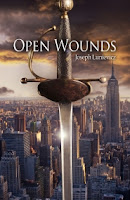 Stiefvater, Maggie. Ballad: A Gathering of Faerie. Woodbury, Minn.: Flux - Llewellyn Publications, 2009. Print. A Gathering of Faerie 2.
Stiefvater, Maggie. Ballad: A Gathering of Faerie. Woodbury, Minn.: Flux - Llewellyn Publications, 2009. Print. A Gathering of Faerie 2.[Book cover credit: librarything.com/work/8109101]
This review contains no spoilers for Lament, and the book really doesn't either. And yet, this isn't quite a stand-alone book. There are a few things, especially in the stressful climax of the action, that will be a bit confusing if you don't at least have a vague idea of the first book.
Booktalk:
When people said "musician," they never seemed to mean "bagpiper." If I heard the phrase "folk musician" one more time, I was going to hit someone.James and Dee, both fully recovered from their summer shenanigans (at least physically), have been recruited by a prestigious music school, miles away from the faeries they're hoping to leave behind. It should be a wonderfully enjoyable, life-changing experience, right? Except it's not. They're both still reeling from the love-proclamation-that-never-was, and neither of them plays the "right" kind of music for their prestigious school. And the faeries have followed them.
p.5
You'd think two people as experienced in the practical consequences of faerie lore as James and Dee would have known they'd be surrounded by faeries at a school named Thornking Ash.
Review:
I love James. In fact, I capital "L" Love him. He's funny and snarky and smart and oh-so-flawed. He's also hopelessly stuck in the friend-zone, and the story he tells from way over there is both hilarious and tragic. That's right. This book is all about James. Even the parts of the story that are told from other points of view are all about James. It's great. He deserves it.
Ballad contains some serious faerie shizz. There's a wack-job wielding an iron crowbar, mysterious singing accompanied by a guy with horns growing out of his head (possibly king of something ;) ), teachers who wear iron jewelry, and the return of Eleanor, Lament's faerie queen, but what this book is really about is how James finally figures out that girls like him. At the opening of this book, his heart is continuing to break over Dee. Still, he finally allows himself to revel in the attention of another woman (and though it gets steamy in a few places, it's totally an intellectual romance). He also finally gets to have some guy friends, even if his closest buds consist of Paul, his oboe playing roommate, and Sullivan, his English teacher/dorm parent. Even at Thornking Ash and without Dee (who contributes with text messages never sent between chapters), James figures out how to be happy.
And this is a Stiefvater book. As you can see, this woman knows how to put words on a page. Her characters are all fully-fleshed people, many of whom I would die to eat Chinese take-out with on a Saturday night. They're funny and smart and a little nerdy. This would be a great book for John Green fans who want to ease into fantasy, or vice-versa.
So far, there's no word of another book in this series, but I still want to throw this out there: Stiefvater, if you're listening, the world could use more James.
Book source: Philly Free Library
Book 1: Lament: The Faerie Queen's Deception
Links to Amazon.com may be affiliate links for the Amazon Associates program. If you buy something through this link, I may receive a referral fee.



